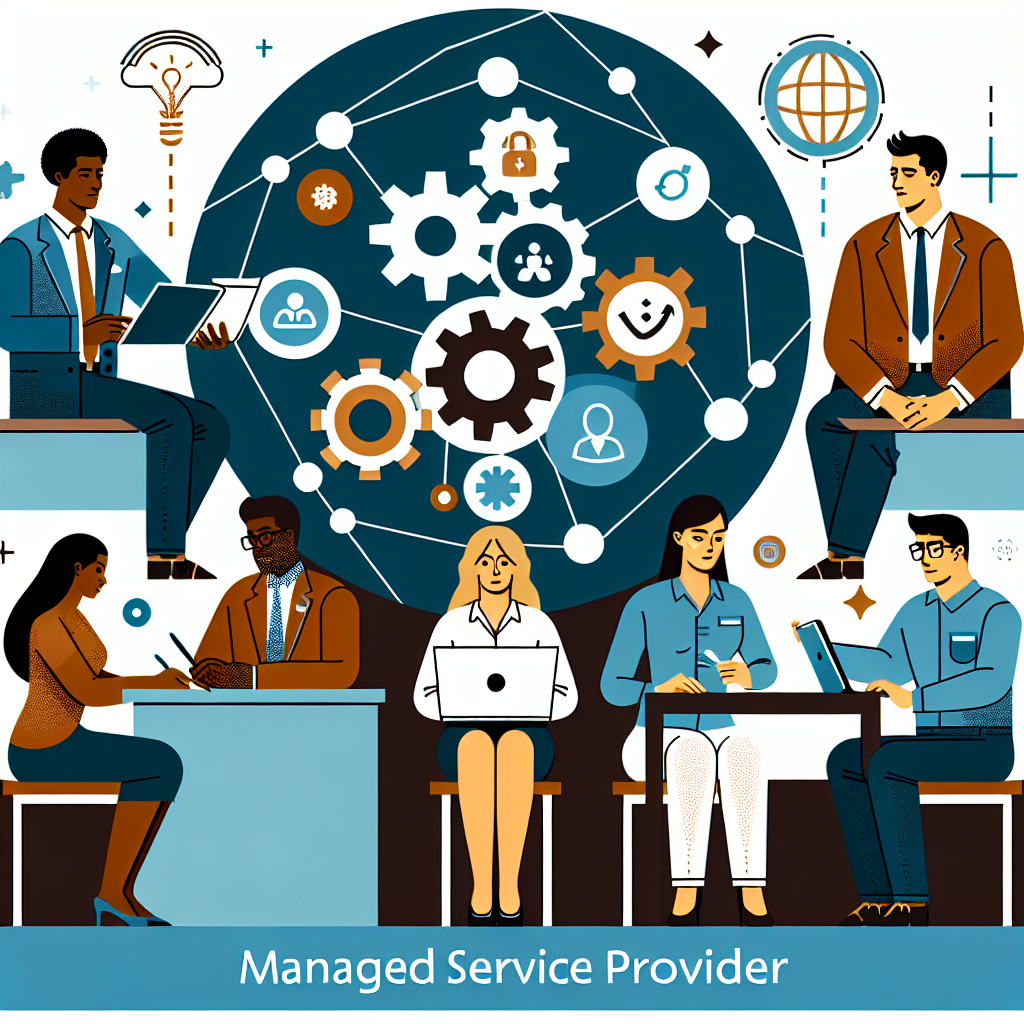Your cart is currently empty!
Tag: Small

Unlocking the Potential of Managed Services for Small Businesses
In today’s fast-paced business environment, small businesses are constantly looking for ways to streamline their operations and increase efficiency. One way they can achieve this is by leveraging managed services to handle their IT needs.Managed services involve outsourcing the management of certain business functions to a third-party provider. This can include services such as IT support, network security, cloud computing, and data backup. By outsourcing these tasks, small businesses can focus on their core activities and leave the technical aspects to experts.
One of the key benefits of managed services for small businesses is cost savings. Instead of hiring a full-time IT staff or investing in expensive hardware and software, businesses can pay a monthly fee for the services they need. This allows them to budget more effectively and avoid unexpected expenses.
Managed services also offer scalability, allowing businesses to easily adjust their services as their needs change. For example, if a business experiences rapid growth, they can easily add more services or upgrade their existing ones without having to invest in additional infrastructure.
Additionally, managed services provide small businesses with access to the latest technology and expertise. IT providers are constantly updating their systems and staying current with industry trends, ensuring that businesses have access to cutting-edge solutions without having to invest in expensive upgrades.
Another advantage of managed services is increased security. With cyber threats on the rise, it is crucial for businesses to have robust security measures in place to protect their data and systems. Managed service providers can offer advanced security solutions such as firewalls, antivirus software, and intrusion detection systems to keep businesses safe from cyber attacks.
Overall, unlocking the potential of managed services can greatly benefit small businesses by improving efficiency, reducing costs, and enhancing security. By outsourcing their IT needs to a trusted provider, businesses can focus on their core activities and achieve greater success in today’s competitive market.

Maximizing ROI with Managed Service Providers: A Guide for Small Businesses
In today’s fast-paced business world, small businesses are constantly looking for ways to maximize their return on investment (ROI). One way to do this is by utilizing managed service providers (MSPs) to handle various aspects of their IT infrastructure.MSPs are third-party companies that provide a range of IT services to businesses, including network monitoring, data backup and security, and software management. By outsourcing these tasks to an MSP, small businesses can free up time and resources to focus on core business activities, while also benefiting from the expertise and resources of a dedicated IT team.
But how can small businesses ensure they are getting the most out of their investment in an MSP? Here are some tips for maximizing ROI with managed service providers:
1. Define your goals: Before partnering with an MSP, it’s important to clearly define your business goals and objectives. This will help you determine which services you need from an MSP and how they can help you achieve your goals.
2. Evaluate your current IT infrastructure: Take stock of your current IT systems and processes to identify areas where an MSP could provide value. This could include improving network security, streamlining software updates, or enhancing data backup and recovery processes.
3. Choose the right MSP: When selecting an MSP, it’s important to do your research and choose a provider that aligns with your business needs and goals. Look for an MSP with experience working with small businesses in your industry, and make sure they offer the services you need at a price that fits your budget.
4. Communicate effectively: Building a strong relationship with your MSP is key to maximizing ROI. Keep lines of communication open, provide clear feedback on their services, and work together to address any issues that arise.
5. Monitor performance: Regularly monitor the performance of your MSP to ensure they are delivering on their promises. Keep track of key metrics such as network uptime, response times, and security incidents to gauge the effectiveness of their services.
6. Continuously improve: Work with your MSP to identify areas for improvement and implement changes to optimize your IT infrastructure. By continuously evaluating and refining your partnership with an MSP, you can ensure you are getting the most out of your investment.
Overall, partnering with an MSP can be a cost-effective way for small businesses to enhance their IT capabilities and maximize ROI. By following these tips, small businesses can build a successful partnership with an MSP that helps them achieve their business goals and drive growth.

How IT Solutions Can Help Small Businesses Compete with Larger Companies
In today’s competitive business landscape, small businesses often struggle to keep up with larger companies that have more resources and manpower. However, with the right IT solutions in place, small businesses can level the playing field and compete effectively with their larger counterparts.One of the key advantages that IT solutions offer small businesses is increased efficiency. By automating repetitive tasks and streamlining processes, small businesses can save time and resources that can be better utilized in other areas of the business. For example, cloud-based project management tools can help small businesses collaborate more effectively, while customer relationship management (CRM) software can help them better understand and engage with their customers.
Additionally, IT solutions can help small businesses improve their customer service and enhance the overall customer experience. For instance, chatbots and virtual assistants can provide round-the-clock support to customers, while data analytics tools can help small businesses better understand their customers’ preferences and behavior. By leveraging IT solutions, small businesses can personalize their interactions with customers and provide a more tailored experience that can help them stand out in a crowded marketplace.
Furthermore, IT solutions can help small businesses better manage their finances and resources. Accounting software can help small businesses track expenses, manage invoices, and generate financial reports, while inventory management tools can help them optimize their supply chain and reduce costs. By having a clear picture of their financial health and resources, small businesses can make more informed decisions that can help them grow and compete with larger companies.
Lastly, IT solutions can help small businesses stay agile and adapt to changing market conditions. With the rise of e-commerce and digital marketing, small businesses need to be able to quickly respond to market trends and customer demands. By leveraging IT solutions such as e-commerce platforms and digital marketing tools, small businesses can reach a wider audience and stay ahead of the competition.
In conclusion, IT solutions can be a game-changer for small businesses looking to compete with larger companies. By increasing efficiency, improving customer service, managing finances, and staying agile, small businesses can level the playing field and thrive in today’s competitive business landscape. Investing in the right IT solutions can help small businesses not only survive but thrive in the long run.

Why Small Businesses Should Consider Partnering with a Managed Service Provider
Small businesses often face numerous challenges when it comes to managing their IT infrastructure. Limited resources, lack of expertise, and the need to focus on core business activities can make it difficult for small businesses to effectively manage their technology needs. This is where partnering with a managed service provider (MSP) can be extremely beneficial.An MSP is a third-party company that manages a business’s IT infrastructure and services on a proactive basis, rather than waiting for something to break. By partnering with an MSP, small businesses can access a wide range of IT services and expertise without the need to hire and train in-house IT staff.
One of the key reasons why small businesses should consider partnering with an MSP is cost savings. By outsourcing their IT needs to an MSP, small businesses can reduce costs associated with hiring and training IT staff, purchasing and maintaining hardware and software, and dealing with unexpected IT issues. MSPs typically offer a range of pricing options, including flat-rate monthly fees, which can help small businesses better budget for their IT expenses.
Additionally, partnering with an MSP can help small businesses improve their overall IT security. MSPs have the expertise and resources to implement and maintain robust security measures, such as firewalls, antivirus software, and data encryption, to protect a business’s sensitive information from cyber threats. This is especially important for small businesses, as they are often targeted by cybercriminals due to their perceived lack of security measures.
Another reason why small businesses should consider partnering with an MSP is the ability to access the latest technology and IT solutions. MSPs are constantly updating their skills and knowledge to stay ahead of the curve when it comes to new technologies and trends. By partnering with an MSP, small businesses can benefit from access to cutting-edge IT solutions that can help them improve productivity, efficiency, and competitiveness.
Furthermore, partnering with an MSP can help small businesses improve their overall IT performance and reliability. MSPs proactively monitor and maintain a business’s IT infrastructure to prevent issues before they occur, minimizing downtime and disruptions to business operations. This can help small businesses maintain a high level of productivity and customer satisfaction.
In conclusion, partnering with a managed service provider can offer numerous benefits for small businesses, including cost savings, improved security, access to the latest technology, and enhanced IT performance and reliability. By outsourcing their IT needs to an MSP, small businesses can focus on what they do best – running and growing their business – while leaving their IT needs in the hands of experts.

Ensuring Business Continuity: Best Practices for Small Businesses
In today’s fast-paced and ever-changing business environment, it is crucial for small businesses to have a plan in place to ensure business continuity in the face of unexpected disruptions. Whether it be a natural disaster, cyber-attack, or pandemic, having a solid plan in place can help small businesses navigate through challenging times and minimize the impact on their operations.Here are some best practices for small businesses to ensure business continuity:
1. Develop a Business Continuity Plan (BCP): Every small business should have a BCP in place that outlines how the business will continue to operate in the event of a disruption. This plan should identify key business processes, critical assets, and potential risks, as well as outline specific steps to take to mitigate those risks and ensure business continuity.
2. Identify key stakeholders: It is important for small businesses to identify key stakeholders, both internal and external, who will be involved in the business continuity process. This includes employees, customers, suppliers, and other partners who play a critical role in the business’s operations.
3. Implement a robust IT infrastructure: In today’s digital age, having a secure and reliable IT infrastructure is essential for small businesses to ensure business continuity. This includes regularly backing up data, implementing cybersecurity measures, and having a plan in place to restore systems and data in the event of a cyber-attack or other IT disruption.
4. Cross-train employees: Cross-training employees on key business processes and tasks can help ensure that the business can continue to operate smoothly even if key personnel are unavailable due to a disruption. This can help minimize downtime and ensure that critical tasks are still being completed.
5. Communicate with stakeholders: Effective communication is key during a business disruption. Small businesses should have a communication plan in place to keep employees, customers, suppliers, and other stakeholders informed about the situation and any changes to operations. This can help maintain trust and confidence in the business during challenging times.
6. Test and update the BCP regularly: It is important for small businesses to regularly test and update their BCP to ensure that it remains relevant and effective. This can help identify any gaps or weaknesses in the plan and allow the business to make necessary adjustments to improve its business continuity strategy.
By following these best practices, small businesses can better prepare for and navigate through unexpected disruptions, ensuring that they can continue to operate and thrive in the face of adversity. Implementing a solid business continuity plan can help small businesses protect their operations, employees, and reputation, and ultimately increase their chances of long-term success.

Top Data Backup Solutions for Small Businesses
In today’s digital age, data is one of the most valuable assets for businesses of all sizes. However, small businesses often overlook the importance of data backup and recovery until it’s too late. Data loss can be devastating for a small business, leading to lost revenue, damaged reputation, and even closure. That’s why it’s crucial for small businesses to invest in reliable data backup solutions to protect their valuable information.Here are some of the top data backup solutions for small businesses:
1. Cloud Backup Services: Cloud backup services offer a convenient and cost-effective solution for small businesses to backup their data securely. With cloud backup, data is stored offsite in secure data centers, protecting it from physical disasters such as fires or floods. Cloud backup services also provide automatic backups, so you don’t have to worry about remembering to back up your data regularly.
2. External Hard Drives: External hard drives are a simple and affordable data backup solution for small businesses. You can manually back up your data to an external hard drive on a regular basis, or use software that automatically backs up your data at scheduled intervals. External hard drives are portable and easy to use, making them a popular choice for small businesses with limited IT resources.
3. Network Attached Storage (NAS): NAS devices are another popular data backup solution for small businesses. NAS devices connect to your network and provide a centralized storage solution for backing up data from multiple devices. NAS devices offer features such as RAID (Redundant Array of Independent Disks) for data redundancy and protection against drive failures.
4. Backup Software: Backup software is a crucial component of any data backup strategy. Backup software automates the backup process, making it easy to schedule regular backups and restore data quickly in the event of a data loss. Many backup software solutions offer features such as encryption, compression, and deduplication to optimize storage space and protect sensitive data.
5. Hybrid Backup Solutions: Hybrid backup solutions combine the benefits of on-premises and cloud backup to provide a comprehensive data protection strategy. With hybrid backup, you can backup your data locally to a NAS device or external hard drive, and also replicate your data to the cloud for offsite protection. Hybrid backup solutions offer the flexibility and scalability to meet the data backup needs of small businesses.
In conclusion, data backup is a critical component of a small business’s IT strategy. Investing in reliable data backup solutions can help protect your business from the devastating consequences of data loss. Whether you choose cloud backup services, external hard drives, NAS devices, backup software, or hybrid backup solutions, it’s essential to have a data backup plan in place to safeguard your valuable information. Don’t wait until it’s too late – start backing up your data today!

How Small Businesses Can Benefit from Cloud Computing
Cloud computing has revolutionized the way businesses operate, offering small businesses access to technology that was once only available to large corporations. With the ability to store and access data and applications over the internet, cloud computing has become an essential tool for small businesses looking to streamline their operations and improve their bottom line.One of the key benefits of cloud computing for small businesses is cost savings. Traditional on-premise IT infrastructure requires a significant upfront investment in hardware and software, as well as ongoing maintenance and upgrades. With cloud computing, small businesses can access the same technology at a fraction of the cost, paying only for the resources they use. This makes it easier for small businesses to scale their operations as needed, without the need for expensive infrastructure investments.
In addition to cost savings, cloud computing offers small businesses increased flexibility and agility. With cloud-based applications and storage, employees can access data and collaborate from anywhere, at any time. This flexibility allows small businesses to be more responsive to customer needs and market changes, giving them a competitive edge in today’s fast-paced business environment.
Cloud computing also offers small businesses enhanced security and reliability. Cloud service providers invest heavily in security measures to protect data stored in the cloud, reducing the risk of data breaches and cyberattacks. Additionally, cloud computing offers built-in redundancy and disaster recovery capabilities, ensuring that small businesses can access their data and applications even in the event of a hardware failure or natural disaster.
Furthermore, cloud computing allows small businesses to stay current with the latest technology trends. Cloud service providers regularly update their offerings with new features and capabilities, ensuring that small businesses have access to the latest tools and applications to help them grow and succeed.
Overall, cloud computing offers small businesses a cost-effective, flexible, and secure solution for managing their IT infrastructure. By leveraging the power of the cloud, small businesses can streamline their operations, improve collaboration, and stay competitive in today’s digital economy. If you’re a small business looking to harness the benefits of cloud computing, now is the time to make the switch and start reaping the rewards.

The Cost-Effectiveness of Managed Service Providers for Small Businesses
In today’s fast-paced business environment, small businesses are constantly looking for ways to cut costs and improve efficiency. One way that many small businesses are achieving this is by partnering with Managed Service Providers (MSPs) to outsource their IT needs.Managed Service Providers are companies that offer IT services and support to businesses on a subscription basis. They handle everything from managing a company’s network and servers to providing help desk support for employees. By outsourcing their IT needs to an MSP, small businesses can save money on hiring and training in-house IT staff, as well as on purchasing and maintaining expensive hardware and software.
One of the key benefits of working with an MSP is cost-effectiveness. MSPs typically offer their services at a fixed monthly fee, which allows small businesses to budget more effectively and avoid unexpected IT expenses. Additionally, by outsourcing their IT needs, small businesses can avoid the costs associated with downtime due to IT issues, as MSPs are able to proactively monitor and address potential problems before they cause major disruptions.
Another cost-saving benefit of working with an MSP is access to the latest technology and expertise. MSPs have the resources and expertise to stay up-to-date on the latest trends and advancements in IT, which means that small businesses can benefit from cutting-edge technology without having to invest in expensive hardware and software themselves. Additionally, MSPs often have a team of highly skilled IT professionals who can provide expert support and guidance to small businesses, helping them to optimize their IT infrastructure and improve productivity.
Overall, the cost-effectiveness of working with a Managed Service Provider makes it an attractive option for small businesses looking to streamline their IT operations and focus on growing their business. By outsourcing their IT needs to an MSP, small businesses can save money, improve efficiency, and gain access to expert support and technology that can help them compete in today’s competitive marketplace.

Evaluating the ROI of IT Solutions for Small Businesses
In today’s digital age, small businesses are increasingly relying on technology to streamline operations, improve efficiency, and enhance customer experiences. From cloud computing and cybersecurity to customer relationship management (CRM) systems and e-commerce platforms, there are a plethora of IT solutions available to help small businesses grow and succeed.However, with limited resources and budget constraints, it’s essential for small businesses to carefully evaluate the return on investment (ROI) of implementing IT solutions. While the upfront costs of purchasing and implementing technology can be significant, the long-term benefits can far outweigh the initial investment.
One of the key factors to consider when evaluating the ROI of IT solutions for small businesses is the impact on productivity and efficiency. For example, implementing a cloud-based project management system can help streamline collaboration among team members, reduce the time spent on manual tasks, and improve overall project efficiency. This can result in cost savings, increased productivity, and enhanced profitability for the business.
Another important consideration is the potential for cost savings and revenue generation. For instance, implementing an e-commerce platform can open up new sales channels, expand the customer base, and drive revenue growth. By reaching a wider audience and providing a convenient online shopping experience, small businesses can increase sales and improve their bottom line.
Furthermore, investing in cybersecurity solutions can help small businesses protect sensitive data, prevent cyber attacks, and avoid costly security breaches. By safeguarding customer information and maintaining a secure online environment, businesses can build trust with customers, avoid regulatory fines, and protect their reputation.
When evaluating the ROI of IT solutions, small businesses should also consider the potential for scalability and growth. Investing in flexible and scalable technology that can adapt to the changing needs of the business can help small businesses stay competitive and agile in a fast-paced market. By investing in technology that can grow with the business, small businesses can avoid the need for costly upgrades and replacements down the line.
In conclusion, evaluating the ROI of IT solutions for small businesses is essential for making informed decisions and maximizing the benefits of technology investments. By considering factors such as productivity gains, cost savings, revenue generation, cybersecurity, scalability, and growth potential, small businesses can assess the value of IT solutions and make strategic investments that will drive success and profitability in the long run.

